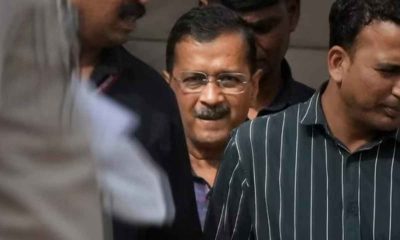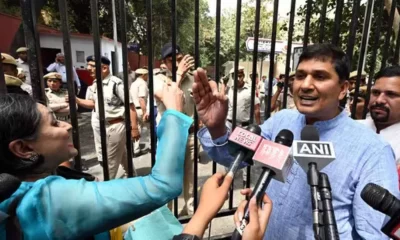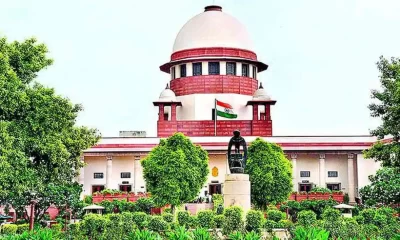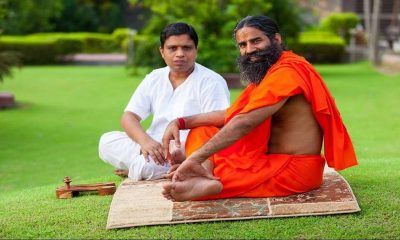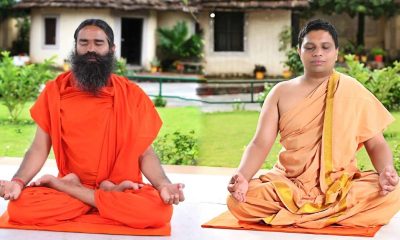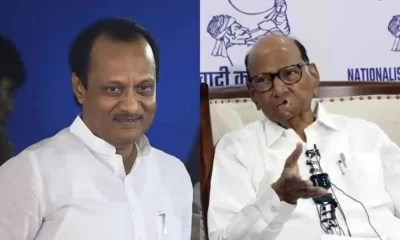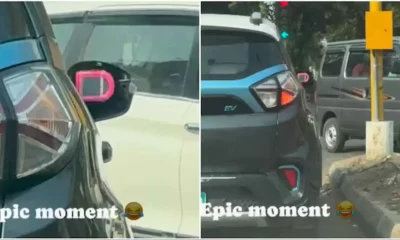India News
Supreme Court tells all States and UTs to implement road safety directives

[vc_row][vc_column][vc_column_text]The Supreme Court on Thursday directed all states and union territories that have not already framed a road safety policy to do so by January 31, and implement it.
Delhi, Assam, Nagaland, Tripura, Lakshadweep, Dadra and Nagar Haveli, and Andaman and Nicobar Islands have not yet set up this policy, the court noted.
The Supreme Court (SC) bench, comprising Justices MB Lokur and Deepak Gupta, was hearing a public interest litigation filed by an orthopaedic surgeon from Coimbatore, S Rajaseekaran. The doctor had submitted that 90% of road accident deaths occur because safety rules are not strictly enforced and the punishment is also not severe.
The SC began by noting that the number of deaths due to road accidents in the country is said to be over 100,000 in a year, which translates to about one death every three minutes. It further noted that insurance companies had spent Rs 11,480 crore as road accident compensation in 2015-16. Only half the number of families of these victims were compensated. This was despite the apex court’s intervention and setting up of a committee on road safety under former Supreme Court judge KS Radhakrishnan.
The SC laid down a slew of steps to be taken for preventing road accidents.
All states must set up in every district a road safety committee that would include the superintendent of police, the health officer and representatives from Public Works Department, National Highways Authority of India and road transport besides a member of civil society.
Also to be set up in each district is a trauma centre with necessary facilities and an ambulance. “The state governments and union territories should take up this recommendation at the earliest since it is on record that treatment soon after a road accident is crucial for saving the life of the victim,” the bench said.
The judges told the states to create a lead agency which would “coordinate activities such as licensing issues, including driving licences, registration of vehicles, road safety and features of vehicles, along with allied matters such as emission norms.” Noting that only a few states have established the Lead Agency as recommended by the Committee on Road Safety in December 2014, it directed those states and UTs which have not done so to establish the Lead Agency on or before January 31, 2018.
The court has made it mandatory for States and Union Territories to establish a Road Safety Fund, frame the Road Safety Action Plan by March 31 and set up a universal accidental helpline number, among other directives.
“The corpus of the Road Safety Fund will be from the fines collected for traffic violations and the Fund will be utilised for meeting expenses relating to road safety,” it said. The court has also directed framing of Road Safety Action Plans by March 31 to reduce the number of road accidents, as well as the fatality rate.
The Union Ministry of Transport and Highways (MoRTH) has been directed to frame a protocol for road design, road quality and to identify black spots, as well as implement “traffic calming” measures at accident spots.
“It appears that one of the main reasons for road accidents is the poor quality of roads, improper design, etc,” the court said.[/vc_column_text][vc_column_text css=”.vc_custom_1512130149734{padding-top: 10px !important;padding-right: 10px !important;padding-bottom: 10px !important;padding-left: 10px !important;background-color: #a2b1bf !important;border-radius: 10px !important;}”]The Supreme Court directions for road safety measures:
- Road Safety Policy: Most of the State Governments and Union Territories have already framed a Road Safety Policy. Those that have not framed such a policy namely Assam, Nagaland, Tripura, Delhi, Lakshadweep, Dadra and Nagar Haveli and Andaman and Nicobar Islands, must now formulate the Road Safety Policy by 31st January, 2018. All States and Union Territories are expected to implement the Road Safety Policy with all due earnestness and seriousness.
- State Road Safety Council: All States have already constituted a Road Safety Council in terms of Section 215 of the Motor Vehicles Act, 1988. The Union Territories of Daman and Diu, Dadra and Nagar Haveli and Andaman and Nicobar Islands have not constituted the Road Safety Council as yet. We direct these Union Territories to constitute the State Road Safety Council on or before 31st January, 2018. The responsibility and functions of the Council will be as recommended by the Committee on Road Safety. The State Road Safety Councils should periodically review the laws and take appropriate remedial steps wherever necessary.
- Lead Agency: Only a few States have established the Lead Agency as recommended by the Committee on Road Safety in its communication of 23rd December, 2014. The States and Union Territories that have not done so should establish the Lead Agency on or before 31st January, 2018 in terms of the recommendations made by the Committee on Road Safety. It may be mentioned that the Lead Agency will act as the Secretariat of the State Road Safety Council and coordinate all activities such as licensing issues including issues of driving licences, registration of vehicles, road safety and features of vehicles, along with other allied matters including emission norms and other activities as mentioned in the communication dated 23rd December, 2014.
- Road Safety Fund: Some of the States have already established a Road Safety Fund. Those States and Union Territories that have not yet established the Road Safety Fund should do so not later than 31st March, 2018 and report back to the Committee on Road Safety. The corpus of the Road Safety Fund will be from the fines collected for traffic violations and the Fund will be utilized for meeting expenses relating to road safety.
- Road Safety Action Plan: The purpose of a Road Safety Action Plan is to reduce the number of road accidents, as well as the fatality rate. The MoRTH has already requested all the States and Union Territories to prepare a Road Safety Action Plan but it appears that the response to this has been somewhat lukewarm. The State Governments and Union Territories are therefore directed to urgently prepare a Road Safety Action Plan by 31st March, 2018 and put it into action after giving it due publicity.
- District Road Safety Committee: A District Road Safety Committee is required to be set up by the State Government for every district in terms of Section 215(3) of the Motor Vehicles Act, 1988. As suggested by the learned Amicus and agreed to by the MoRTH, the District Road Safety Committee should be put in place by 31st January, 2018 and should be headed by the Collector of the District and should include amongst others the Superintendent of Police, Health Officers, Engineers of the Public Works Department, representatives of the National Highways Authority of India, the Road Transport Officer of the District and members of civil society from the District. The District Road Safety Committee must hold regular and periodic meetings to review road safety issues and take corrective measures.
- Engineering Improvement: It appears that one of the main reasons for road accidents is the poor quality of roads, improper design, etc. The MoRTH is of the opinion that the protocol for road design and identification of black spots needs to be reviewed and enforced. Accordingly, it is directed that the MoRTH should publish a protocol for identification and rectification of black spots and take necessary steps for improving the design of roads to make them safe.
- Traffic Calming Measures: It is suggested by the learned Amicus that traffic calming measures must be adopted at accident prone areas. This is agreed to by the MoRTH. However, such measures will need to be studied and then put in place. This is an on-going exercise which must be carried out by the Road Safety Committee with the assistance of the MoRTH and other stakeholders.
- Road Safety Audits: There is agreement, in principle, between the learned Amicus and the MoRTH to carry out Road Safety Audits. However, there appears to be a dearth of qualified auditors in Road Safety Engineering. The MoRTH supports the idea of capacity building. It is, therefore, directed that necessary steps be taken by the Committee on Road Safety as well as by the MoRTH to work in this direction since there can be little doubt that an audit of road safety is essential to reduce the possibility of road accidents through corrective measures.
- Engineering Design of New Roads: The MoRTH is of the view, and the learned Amicus is also in agreement, that the Road Safety Audit as mentioned above should include the design stage audit of new road projects of 5 kms or more, rather than being based on the cost of the project. It is ordered accordingly.
- Working Group on Engineering: The Working Group on Engineering (Roads) has already submitted a Report which is available with the Road Safety Committee as well as the MoRTH. This Working Group was constituted pursuant to the decision taken in the meeting of the 12th National Road Safety Council held on 25th March, 2011. The recommendations of the Working Group should be implemented in the terms prayed for by the learned Amicus as well as those accepted by the MoRTH. These will, of course, be in the nature of interim directions since the National Road Safety Board is likely to be created as proposed in the Motor Vehicles (Amendment) Bill, 2017.
- Drivers‟ Training: This is the subject matter of the Motor Vehicles (Amendment) Bill, 2017 and no orders are required to be passed in this regard.
- Lane Driving: The MoRTH has already issued Motor Vehicles (Driving) Regulations, 2017 vide G.S.R. 634 (E) dated 23rd June, 2017.
The Notification should be implemented by the State Governments and Union Territories strictly.
- Road Safety Equipment: The Bureau of Police Research and Training has already prepared a Report on the subject and has submitted it to the Road Safety Committee in September, 2015. The recommendations in the Report should be implemented including acquisition of cameras and surveillance equipments in detecting traffic and identifying violators. It is also necessary to set up special patrol forces along the National Highways and State Highways for which necessary steps must be taken by the State Governments and Union Territories.
- Alcohol and Road Safety: The MoRTH has already written to the States to comply with orders of this Court in this regard. The MoRTH may issue further advisories in this regard on a quarterly basis during the calendar year 2018 so as to serve as a reminder to the State Governments and Union Territories to implement the directions of this Court.
- Road Safety Education: The learned Amicus as well as MoRTH are in agreement that road safety education and counselling should be incorporated in the curriculum by the State Boards by 1st April, 2018. It is directed that the State Governments may seriously consider this recommendation and include Road Safety Education and Counseling as a part of the school curriculum at the earliest.
- Speed Governors: Guidelines in this regard have already been issued by the MoRTH. The MoRTH has agreed to upload the Unique Identification Number of the speed governors in the VAHAN database. This should be followed up by the MoRTH with expedition.
- Emergency Medical Care: There is agreement that at least one Trauma Care Centre should be set up in every district with necessary facilities and an ambulance. The State Governments and Union Territories should take up this recommendation at the earliest since it is on record that treatment soon after a road accident is crucial for saving the life of the victim. In this context, it may also be mentioned that this Court has issued certain directions in Pt. Parmanand Katara v. Union of India1 which should be followed.
- Universal Accident Helpline Number: The MoRTH has stated that there is already a call centre number, that is, 108 provided by the National Health Mission. Due publicity must be given to this so that an ambulance can be activated at the earliest whenever necessary.
- Permanent Road Safety Cell: All State Governments and Union Territories have already been requested by the MoRTH to set up Road Safety Cells. The State Governments and Union Territories should establish Permanent Road Safety Cells by 31st January, 2018.
- Data Collection: The MoRTH has already taken steps for recording accident data and reports through computerised data entry. The State and Union Territories have been asked to take further action in this regard and make the data public for the information of all stakeholders. This needs to be followed up and no further orders are necessary in this regard.
- GPS : The MoRTH has already notified vide G.S.R. No. 1095 (E) dated 28th November, 2016 mandating the fitment of vehicle location tracking devices in all public service vehicles subject to some exceptions. Since this has cost implications, the MoRTH may assist the State Governments and Union Territories to ensure that to the maximum extent possible and within the shortest time frame, location tracking devices must be fitted in all public service vehicles as notified.
- Bus/Truck–Body Building Code: This has already been notified by the MoRTH with regard to buses vide G.S.R. No. 287 (E) dated 27th April, 2014 and with regard to trucks vide G.S.R. No. 1034(E) dated 2nd November, 2016. No further orders are necessary in this regard.
- ABS, Air Bags and Headlights: The MoRTH has already notified for fitment of ABS in motor cycles vide G.S.R. No. 310(E) dated 16th March, 2016 and for four wheelers vide G.S.R. No. 120(E) dated 10th February, 2017. As far as air bags are concerned a standard AIS-145 has already been notified. As regards automated headlights, the MoRTH has notified vide G.S.R. No. 188(E) dated 22nd February, 2016 for fitment of “Automated Headlights On” in two wheelers manufactured on or after 1st April, 2017. No further orders are required in this regard except the faithful implementation of the various notifications issued by the MoRTH.
- Crash Test: This too has been notified by the MoRTH and the test for all light motor vehicles is required to be conducted by the testing agency notified under Rule 126 of the Central Motor Vehicles Rules, 1989. No further orders are required in this regard except the faithful implementation of the notifications and crash standards issued by the MoRTH.
[/vc_column_text][/vc_column][/vc_row]
2024 Lok Sabha Elections
PM Modi says Congress leaders consider themselves above Lord Ram
PM Modi slammed Congress during a rally in Chhattisgarh, ahead of the Lok Sabha elections 2024
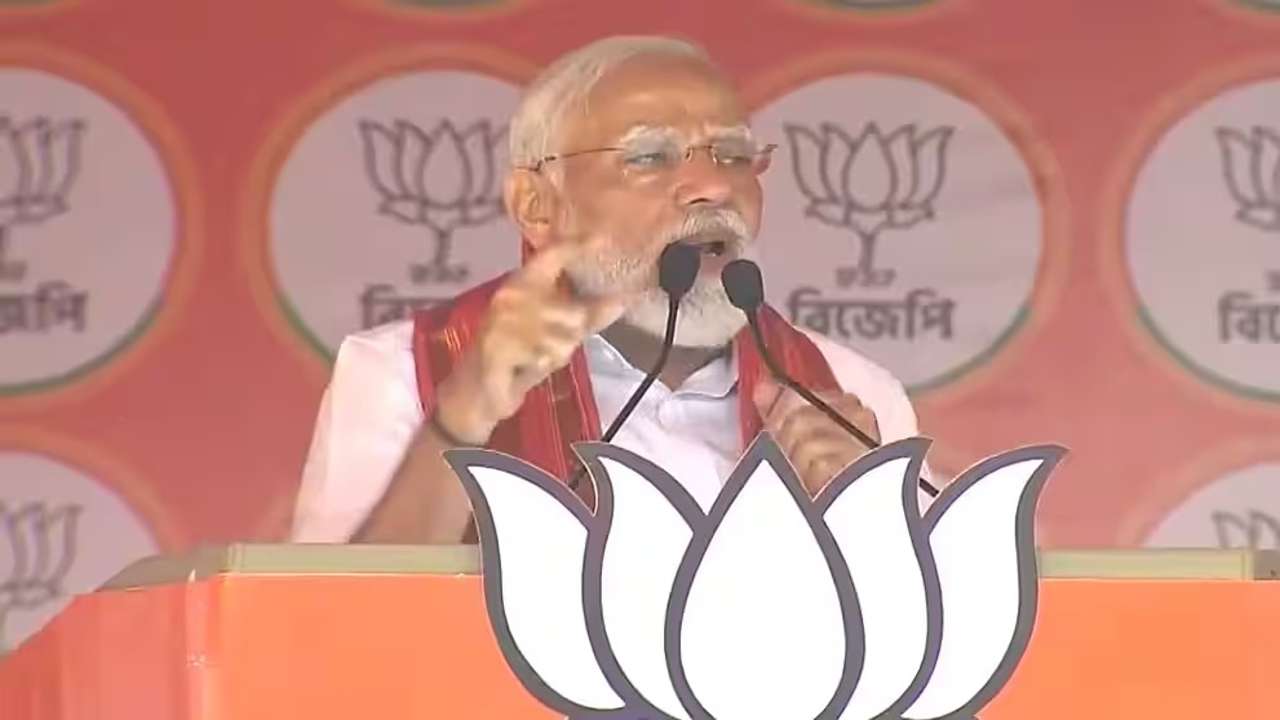
Prime Minister Narendra Modi slammed the Congress party for declining to attend the pran pratishtha ritual at the Ayodhya Ram temple on January 22 this year.
The prime minister said Congress leaders consider themselves above Lord Ram and denied invitation for Pran Pratishtha at Ram Temple, while speaking at a rally in Janjgir-Champa, Chhattisgarh. The PM question the people present at the rally that is it not a disrespect of Mata Shabri? Congress leaders inclination toward appeasement politics runs in their family.
For political appeasement, they won’t think twice about stealing the rights of Adivasis, the poor, and Dalits. Poor, young, and women are BJP’s top priorities, Modi said.
PM Modi criticized the Congress again during the rally for claiming that the BJP would alter the constitution.
The leaders of Congress recite the same old phrases whenever an election is about to happen, the PM said. He also said they claim that if the BJP wins power, it will renounce the constitution and abolish reservations. For how long will you continue selling lies?” he asked.
The prime minister continued saying that nobody can change the Constitution, even if Dr. Babasaheb Ambedkar were to come and insist on it, it wouldn’t happen.
Those in the Congress threaten to break Modi’s head. Nobody can harm Modi as long as the mothers and sisters of this county stands by him. These mothers and sisters are Raksha Kavach, Modi remarked.
The prime minister further attacked the Congress after Viriato Fernandes, the party’s candidate for South Goa, asserted that Goa was forced to adopt the Indian Constitution.
Referring to his conversation with Congress leader Rahul Gandhi ahead of the 2019 Lok Sabha elections, Fernandes said he had told him, when Goa was liberated in the year 1961, the Indian Constitution was forced upon us.
The prime minister said, Congress candidate from Goa says Constitution was forced upon Goans; is this not an insult of Ambedkar and Constitution.
2024 Lok Sabha Elections
Amit Shah says neither Congress nor Trinamool chief Mamata Banerjee can interfere with CAA
Amit Shah revealed the BJP’s target for West Bengal and said they have set a target of winning 35 Lok Sabha seats from West Bengal.
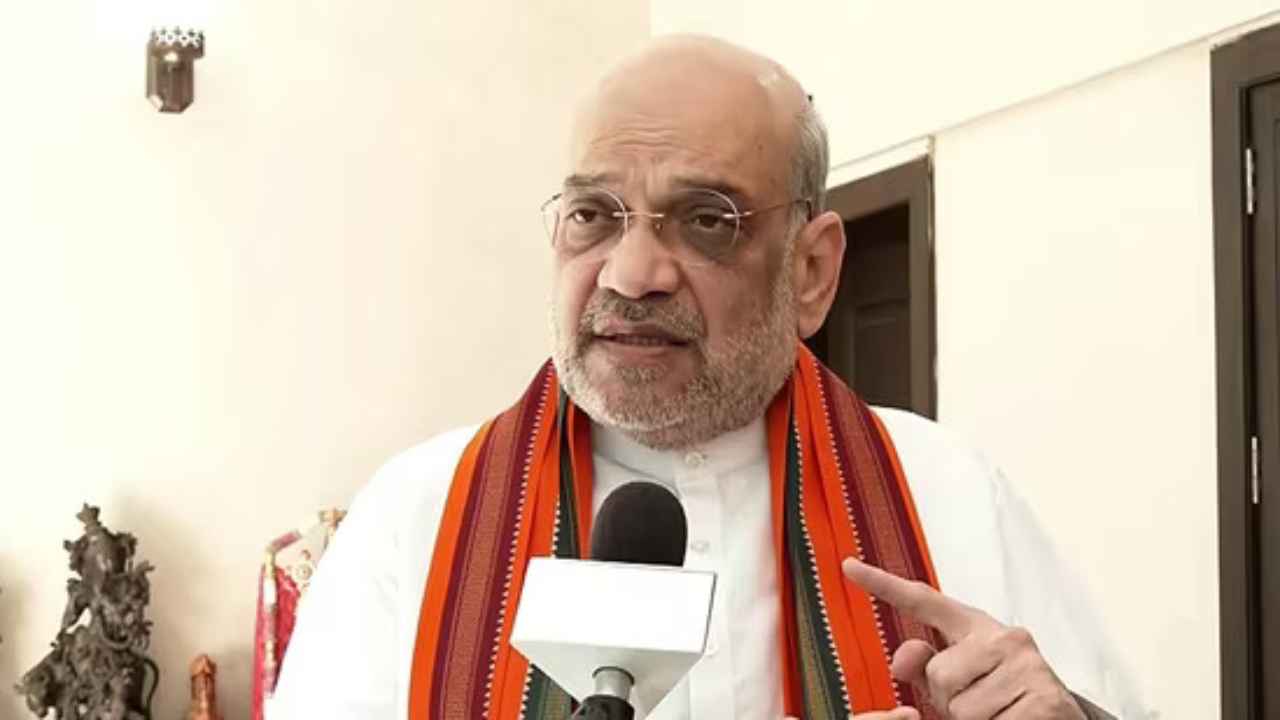
Union home minister Amit Shah on Tuesday said neither Congress nor Trinamool Congress chief Mamata Banerjee can interfere with the Citizenship Amendment Act (CAA). He was speaking at the Karandighi rally in West Bengal where he also made the prediction as to how many seats BJP will win in the Lok Sabha elections in West Bengal.
The union home minister asked the masses to cut the money culture. Amit Shah revealed the BJP’s target for West Bengal and said they have set a target of winning 35 Lok Sabha seats from West Bengal. In 2019 Lok Sabha elections the BJP had won 18 out of 42 seats in West Bengal. He asked Mamata Banerjee, what problem will she have if the Buddhist and Hindu refugees from Bangladesh get citizenship in India?
Shah further added if the people of West Bengal want to stop infiltration in the state, then they will have to make Narendra Modi the Prime Minister of India again. He said if the people of West Bengal want to free Bengal of violence, stop infiltration in the state, give citizenship to refugees, to stop disrespecting mothers and sisters of the state as it happened in Sandeshkhali, then only way is to make Narendra Modi the Prime Minister.
Amit Shah said that PM Modi had sent Rs 7 lakh crore to West Bengal but the TMC indulged in corruption. He said one can see the houses of Trinamool Congress leaders; 10 years ago they used to live in a hut, moved on cycle and now all of them have 4-storey houses and move around in big cars. He added this is the money of people of West Bengal.
The Citizenship Amendment Act (CAA), will make it easier for non-Muslim refugees from Afghanistan, Pakistan and Bangladesh to get Indian citizenship, was enacted in 2019. But the rules were notified in March this year by the Centre.
2024 Lok Sabha Elections
Prime Minister Narendra Modi says listening to Hanuman Chalisa under Congress rule is a crime
PM Modi was addressing an election rally in Rajasthan’s Tonk-Sawai Madhopur, on a day as India celebrates Hanuman Jayanti.
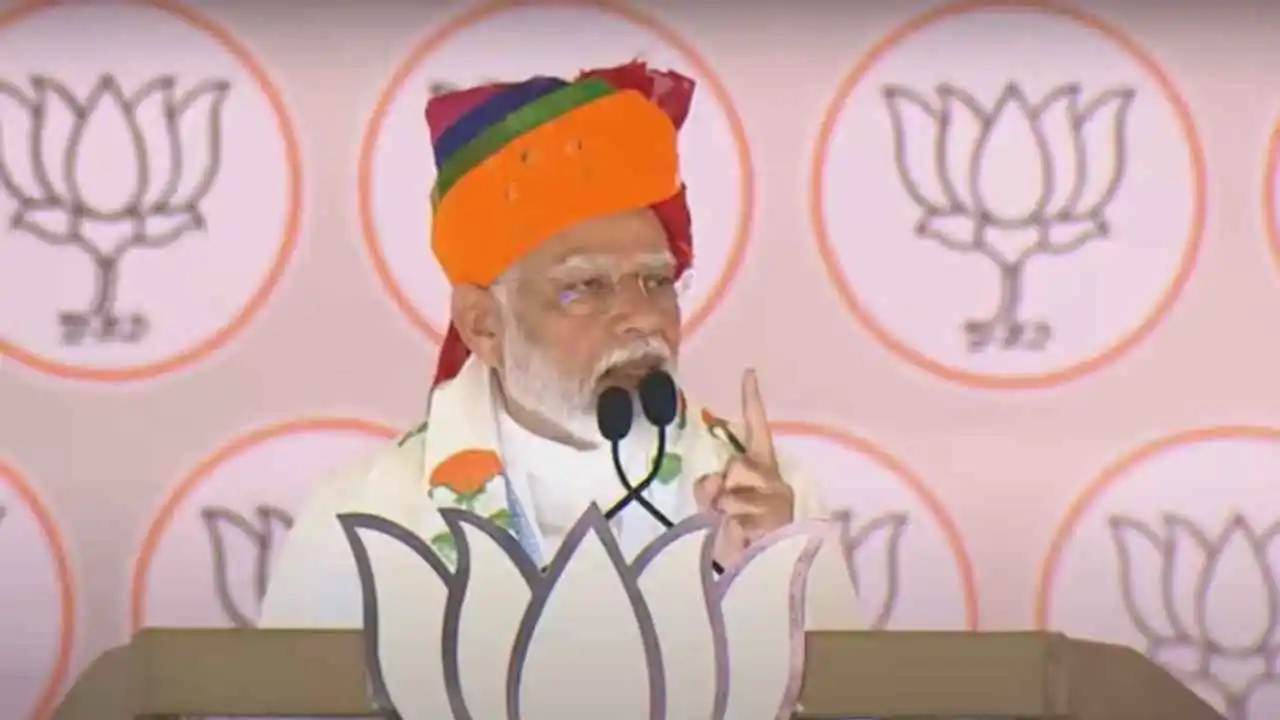
Prime Minister Narendra Modi on Tuesday hit out at the Congress and said even listening to Hanuman Chalisa has become a crime under the party’s rule. The Prime Minister also said it was difficult to follow one’s faith under the party and accused it of hatching a deep conspiracy to snatch people’s wealth and distribute it among selected few people in the society. PM Modi was addressing an election rally in Rajasthan’s Tonk-Sawai Madhopur, on a day as India celebrates Hanuman Jayanti.
PM Modi said in a state like Rajasthan where people chant Ram-Ram, Congress banned Ram Navami. He reffered to the redistribution of wealth remarks he had made during a rally in Rajasthan’s Banswara on Sunday and said it has angered the Congress and INDI Alliance so much that they have started throwing abuses at Modi everywhere.
The Prime Minister said that Congress has written in their manifesto that they will survey the wealth. He said the Congress leadership had said in a speech that an X-ray of wealth will be done. He added when Modi exposed the secret then the hidden agenda came out and this has left the people trembling. PM Modi further added that the Congress party has played with the Constitution of the India.
He said when the Constitution was drafted, reservations based on religion were opposed, so that Scheduled Casts (SC), Scheduled Tribes (ST) and Other Backward Classes (OBC) could get protection. He said former Prime Minister Dr Manmohan Singh had said that Muslims have the first right to the country’s resources. The prime minister further added Congress’s ideology has always been of appeasement and vote bank politics. He said stones would still be pelted in Jammu and Kashmir, and enemies would still be cutting off the heads of India’s soldiers had Congress been in power.
-
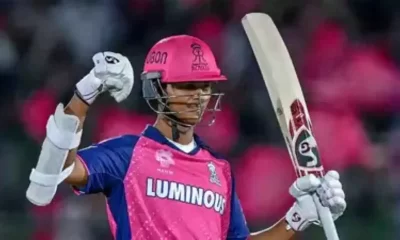
 Cricket news22 hours ago
Cricket news22 hours agoIPL 2024: Yashasvi Jaiswal hits brilliant century to help Rajasthan Royals beat Mumbai Indians by 9 wickets
-
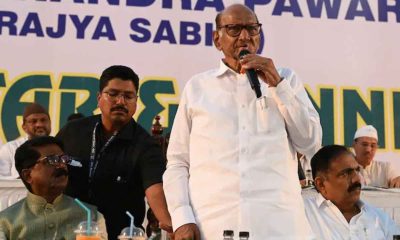
 2024 Lok Sabha Elections21 hours ago
2024 Lok Sabha Elections21 hours agoNCP (SP) leader Sharad Pawar says Prime Minister Narendra Modi is trying to create fear like Russian President Vladimir Putin
-
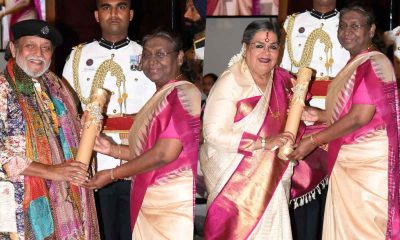
 Entertainment20 hours ago
Entertainment20 hours agoMithun Chakraborty, Usha Uthup honoured with Padma Bhushan
-

 Entertainment18 hours ago
Entertainment18 hours agoFan jumps on stage and hugs Atif Aslam during concert, video goes viral
-
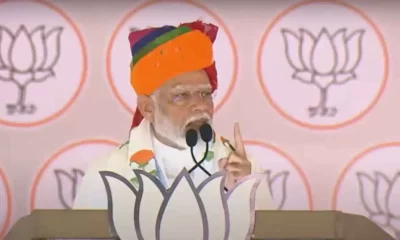
 2024 Lok Sabha Elections20 hours ago
2024 Lok Sabha Elections20 hours agoPrime Minister Narendra Modi says listening to Hanuman Chalisa under Congress rule is a crime
-

 Entertainment16 hours ago
Entertainment16 hours agoManisha Koirala reveals reason for rejecting Dil To Pagal Hai, says regrets that decision
-
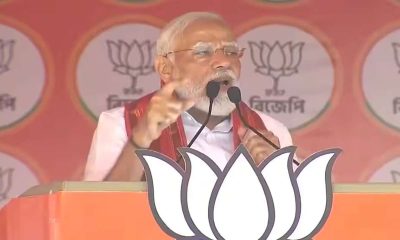
 2024 Lok Sabha Elections15 hours ago
2024 Lok Sabha Elections15 hours agoPM Modi says Congress leaders consider themselves above Lord Ram
-
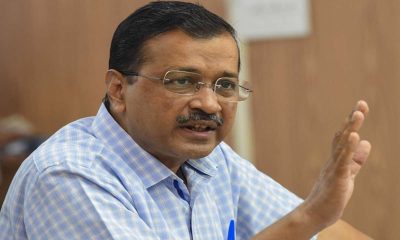
 India News22 hours ago
India News22 hours agoArvind Kejriwal given insulin in Tihar jail after sugar levels touch 320

